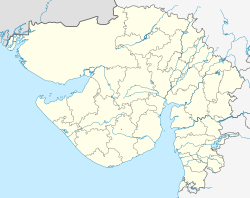This article needs additional citations for verification .(April 2010) |
Nadiad Natpur Natdra | |
|---|---|
City | |
| Nickname: Sakshar Nagari | |
| Coordinates: 22°41′N72°52′E / 22.69°N 72.86°E | |
| Country | |
| State | Gujarat |
| District | Kheda |
| Government | |
| • Type | Mayor–Council |
| • Body | Nadiad Municipal Corporation |
| • Municipal Commissioner | IAS G.H Solanki (2025) |
| • Deputy Municipal Commissioner | Shri Mahendra M. Desai (2025) |
| Area | |
• City | 78.55 km2 (30.33 sq mi) |
| • Rank | 8th in Gujarat |
| Elevation | 35 m (115 ft) |
| Population (2011) | |
• City | 330,000 (2,025) |
| • Rank | 14th in Gujarat |
| • Density | 6,170.94/km2 (15,982.7/sq mi) |
| • Metro | 408,000 (2,025) |
| Demonym(s) | Nadiadi, Charotari |
| Languages | |
| • Official | Gujarati, Hindi, English |
| Time zone | UTC+5:30 (IST) |
| PIN | 387 001, 387 002, 387 370, 387 355, 387 230, 387 320 |
| Telephone code | 0268 |
| Vehicle registration | GJ-07 |
| Website | nadiadnmc |
Nadiad is a city in the state of Gujarat, India and the administrative centre of the Kheda district. It is known for the Santram Mandir, the Mai Mandir; [1] It is the birthplace of Sardar Vallabhbhai Patel, the first Deputy Prime Minister of India.


